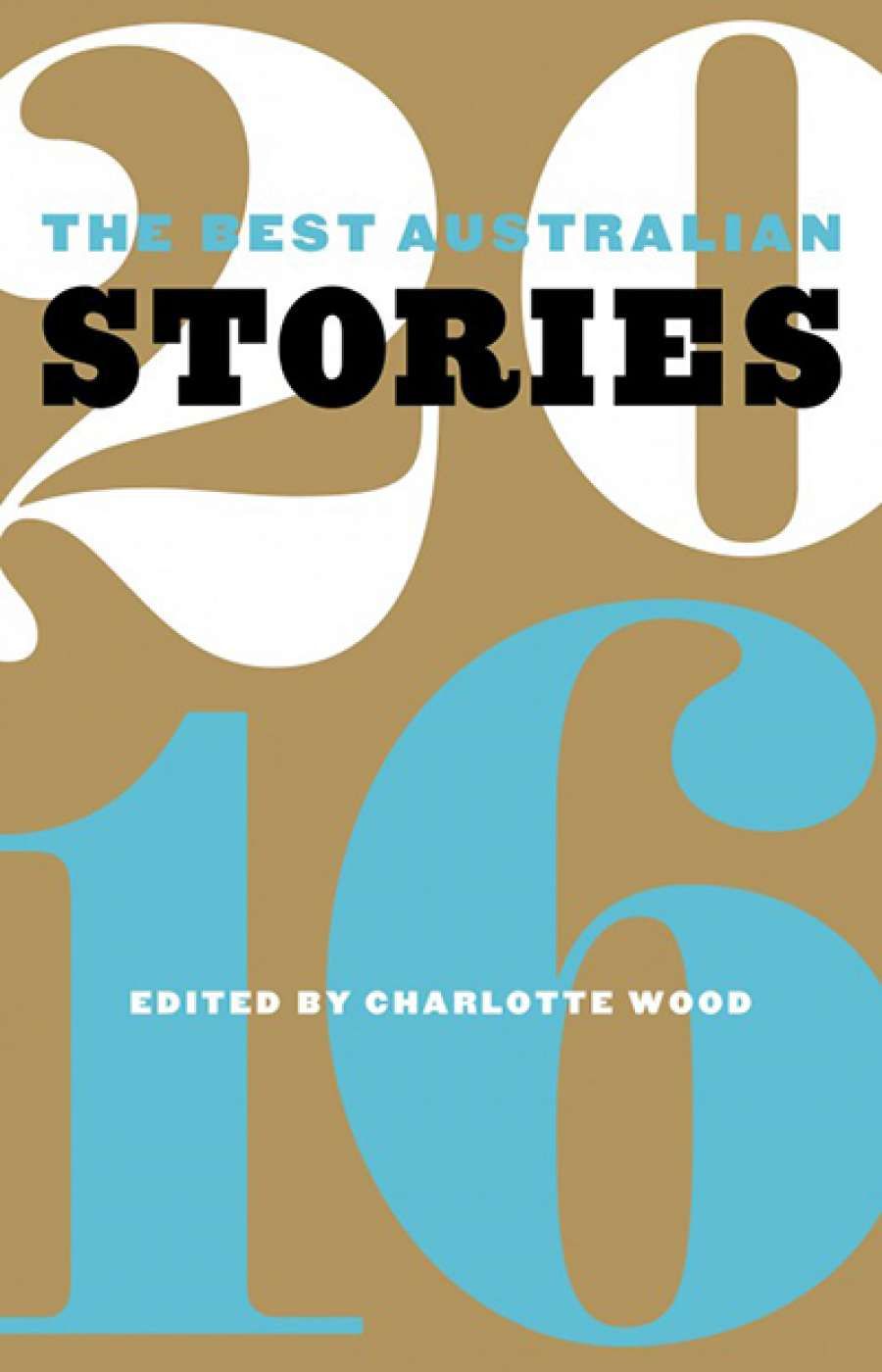
- Free Article: No
- Contents Category: Fiction
- Custom Article Title: Kerryn Goldsworthy reviews 'The Best Australian Stories 2016' edited by Charlotte Wood
- Custom Highlight Text:
If a collection of stories is put together on the basis that these are the ‘best Australian stories of 2016’, is it fair or reasonable to hope for some kind of cohesiveness or gestalt beyond ...
- Book 1 Title: The Best Australian Stories 2016
- Book 1 Biblio: Black Inc. $29.99 pb, 230 pp, 9781863958868
Her introduction to this anthology is thoughtful and meaty, discussing the ideas behind her choice of stories. She begins with a quotation from the American abstract painter Laurie Fendrich: ‘Ever since the invention of painting on canvas, paint itself has been part of the meaning of a painting.’ She uses this as an analogy for writing: ‘meaning is generated in the application of language itself, rather than purely from the writer’s desire or intentions ... The words do not merely tell, but are the story.’
Wood then quotes from her interview with Amanda Lohrey: ‘“There’s the literal surface of life,” Lohrey told me, “and then there’s that oceanic meaning underneath ... any narrative that doesn’t have a few messages from that realm is, for me, deficient.”’ For herself as a writer, Wood says, these messages from another realm arise from the choosing and the placing of the words themselves, rather than from some pre-existing idea of what the work is consciously intended to mean. This sense of well-placed words giving rise to the message from beyond is what ‘distinguishes art from mere storytelling ... I can see that it’s this sense more than anything else that has guided my choice of stories.’
Reading the book, you can see what she means. This is a very varied collection and some of the stories are startlingly imaginative, emotive, and original, especially Paddy O’Reilly’s ‘Monster Diary’ and Ellen van Neerven’s ‘Blueglass’: both are stories you need to let wash over you without worrying too much about interpretation. Fiona McFarlane’s ‘Good News for Modern Man’ is a message from the depths of the ocean, and so, in a very different way, is Michelle Wright’s ‘Blur’, while James Bradley’s ‘Martian Tryptich’ brings news from the solar system. In other stories there are messages from realms equally mysterious but much closer to home, messages from the unmanageable inner reaches of heart and soul, in the bleak, uncompromising story ‘A Few Days in the Country’ by Elizabeth Harrower, or in the depths of strangeness plumbed by David Brooks’s ‘Grief’.
In Australian writing over the last few years, there has been a sharp upward swing in awareness, emotion, and knowledge to do with the natural world as whole landscapes and entire species are threatened, and that is very noticeable in this collection. James Bradley, like Elizabeth Tan in ‘Coca-Cola Birds Sing Sweetest in the Morning’, envisions a denuded future that is very different from the present as we know it and yet an easily imaginable step from here to there. Like Wright’s ‘Blur’ and Gregory Day’s ‘Moth Sea Fog’, Trevor Shearston’s ‘A Step, A Stumble’ shows how easy it is for the natural world to overwhelm and destroy us. Less grand but equally lethal dangers are explored in Jennifer Down’s ‘Alpine Road’ and Jack Latimore’s ‘Where Waters Meet’, both of which belong to the strong Australian literary tradition of social realism and illustrate a wise remark once made by Germaine Greer: ‘Life is too hard for most people.’
 Charlotte WoodThe other contributors include Tegan Bennett Daylight, Nasrin Mahoutchi, Brian Castro, Michael McGirr and Kate Ryan. Every story in the book has earned its place: there are no false notes, no straining after effect, no smell of the lamp.
Charlotte WoodThe other contributors include Tegan Bennett Daylight, Nasrin Mahoutchi, Brian Castro, Michael McGirr and Kate Ryan. Every story in the book has earned its place: there are no false notes, no straining after effect, no smell of the lamp.
I am making this book sound more solemn than it is, but it is leavened throughout with various kinds of humour, and two stories in particular manage to be both substantial and hilarious. Julie Koh’s ‘The Fat Girl in History’, which I first read in her excellent début collection, Portable Curiosities (2016), nods to Peter Carey and is a playful story about sexism and racism, if you can imagine such a thing. And Abigail Ulman’s story ‘Frida Boyelski’s Shiva’ is about a Jewish mother trying to come to terms with her daughter Ruthie’s transformation into Rafael: ‘“You mean to tell me, you’re gay?” Frida asked. “No,” Ruthie said. “I’m telling you I’m trans.”’
This subject matter could make for a tragic story, but Ulman sacrifices nothing of complexity or empathy for all parties in making it very funny. In placing it as the last story, Wood has chosen to make the last word in this anthology a moment of redemption and recovery on the upward curve of a smile. ‘His fingers were slender and strong, and he gripped Frida’s arm and held on tight as she struggled, and then managed, to rise to her feet.’


Comments powered by CComment